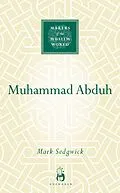Muhammad Abduh (1849-1905) is widely regarded as the founder of Islamic modernism. Egyptian jurist, religious scholar and political activist, he sought to synthesise Western and Islamic cultural values. Arguing that Islam is essentially rational and fluid, Abduh maintained that it had been stifled by the rigid structures implemented in the generations since Muhammad and his immediate followers. In this absorbing biography, Mark Sedgwick examines whether Abduh revived true Islam or instigated its corruption.
Autorentext
Mark Sedgwick is Associate Professor of Arab History, Culture and Society at Aarhus University in Denmark. He is the author of Islam and Muslims: A Guide to Diverse Experience in A Modern World.
Inhalt
Preface
1 THE STUDENT
Tanta
Cairo
Afghani
Graduation
2 INTRODUCTION TO POLITICS
Muhammad Abduh's Teaching
Politics
Freemasonry
The Opposition Press
Intervention
Defeat
3 URABI AND EXILE
Muhammad Abduh the Editor
Muhammad Abduh and Urabi
Triumph and Renewed Defeat
Exile
Afghani, Muhammad Abduh and Islam
To Paris
4 PARIS
Muhammad Abduh and Wilfrid Blunt
Al-Urwa al-wuthqa
5 BEIRUT
The Break with Afghani
In Search of an Occupation
Risalat al-Tawhid
6 THE RETURN TO EGYPT
The National Courts
The Azhar Council
Appointment as Mufti
Law Reform
7 THE MUFTI
The Azhar Lectures
Newspapers
Education
8 THE FATWAS
Financial Fatwas
The Transvaal Fatwa
Muhammad Abduh's Methodology
Muhammad Abduh's Intentions
9 ADVERSITY
Opposition in the Press
Deteriorating Relations with the Khedive
Reactions to the Transvaal Fatwa
Resignation
Death
The Enemy of God?
10 THE AFTERMATH
Public Life
Islam
Views on Muhammad Abduh
Conclusion
Glossary
Further Reading
Bibliography
Index
